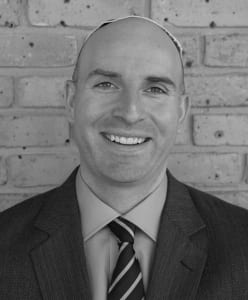
Color Guard at Maj. Gideon Lichtman’s Internment
Rabbi Aaron A. Rozovsky, Goldring/Woldenberg Institute of Southern Jewish Life
JACKSON, Mo. – When we serve as Soldiers, Marines, Coast Guardsmen, Airmen, and Sailors, we sacrifice a great deal. We are away from our homes, communities, friends, and loved ones for extended periods of time. We are in a calling that inherently places our lives on the line which is why some of us have to go to places like Arlington National Cemetery to visit our friends, and some of the things that we experience stay with us long after we take off our uniforms. No one can blame a veteran for wanting to be left alone after having given so much.
Toward the end of the book of Deuteronomy, in parashah Ha-azinu (“Listen”), Moses delivers a lengthy sermon, often called “The Song of Moses.” He details what will happen to the Israelites if and when they sin, and how they will be redeemed. After this powerful declaration, he tells the people, “Take to heart all the words with that I have warned you this day. Enjoin them upon your children, that they may observe faithfully all the terms of this Teaching” (Deuteronomy 32:46). The 16th-century Italian Rabbi Obadiah ben Jacob Sforno elaborates on this verse, writing, “At the end of your lives, when you pass on an ethical will, enjoin these words upon them”.[i]

Rabbi Aaron Rozovsky
In his famous pamphlet series, The American Crisis (written in support of the patriot cause during the American Revolution), the English philosopher Thomas Paine declares, “These are the times that try men’s souls. The summer soldier and the sunshine patriot, will, in this crisis, shrink from the service of their country; but he that stands by it now deserves the love and thanks of man and woman.”[ii] Almost two centuries later, President John F. Kennedy proclaimed, “Ask not what your country can do for you; ask what you can do for your country”.[iii]
If Moses, Sforno, Paine, and Kennedy were separated by so much time, distance, and circumstance, what could these men and their words possibly have in common? Perhaps it is this: our service can never end, because the eyes of our descendants are upon us. As Jews and as American fighting men and women, we are forever obligated to serve. That is simply who we are at our core. But we can’t be soldiers all our days, nor were we meant to be. Taking off our uniforms does not mark the end of our service, nor is it the closing of a book; rather, it is the ending of one chapter in a lifetime of selflessly giving back to our communities and our nation. As members of the armed forces, we demonstrate to future generations why serving in uniform is so vital to embracing and upholding our national character. Now as veterans, no longer in our dress uniforms or battle fatigues, but sporting our civilian attire, we must find new ways to serve. We must continue to be role models for the impressionable young people in our communities, in whose hands the fate of our nation rests.
About the Author: Rabbi Aaron A. Rozovsky is a 2018 ordainee of the Cincinnati campus of Hebrew Union College-Jewish Institute of Religion. He is the Director of Rabbinical Services at the Goldring/Woldenberg Institute of Southern Jewish Life in Jackson, Mississippi. Rabbi Rozovsky is also a Chaplain with the rank of Captain in the Rhode Island Army National Guard. He has been in the military for over 12 years and has deployed to both Afghanistan and Guantanamo Bay in support of Operation Enduring Freedom.
[i] Sforno’s commentary on Deuteronomy 32:46 (courtesy Carasik, Michael. The Commentator’s Bible-The Rubin JPS Miqra’ot Gedolot: Deuteronomy. Philadelphia: The Jewish Publication Society. 2015. p.236)
[ii] Paine, Thomas. “The American Crisis” (Vol 1). Pennsylvania Journal. December 23, 1776. (courtesy ushistory.org)
[iii] Kennedy, John F. Inaugural Address. January 20, 1961. (courtesy ushistory.org)
Volume 72. Number 3. Fall 2018

